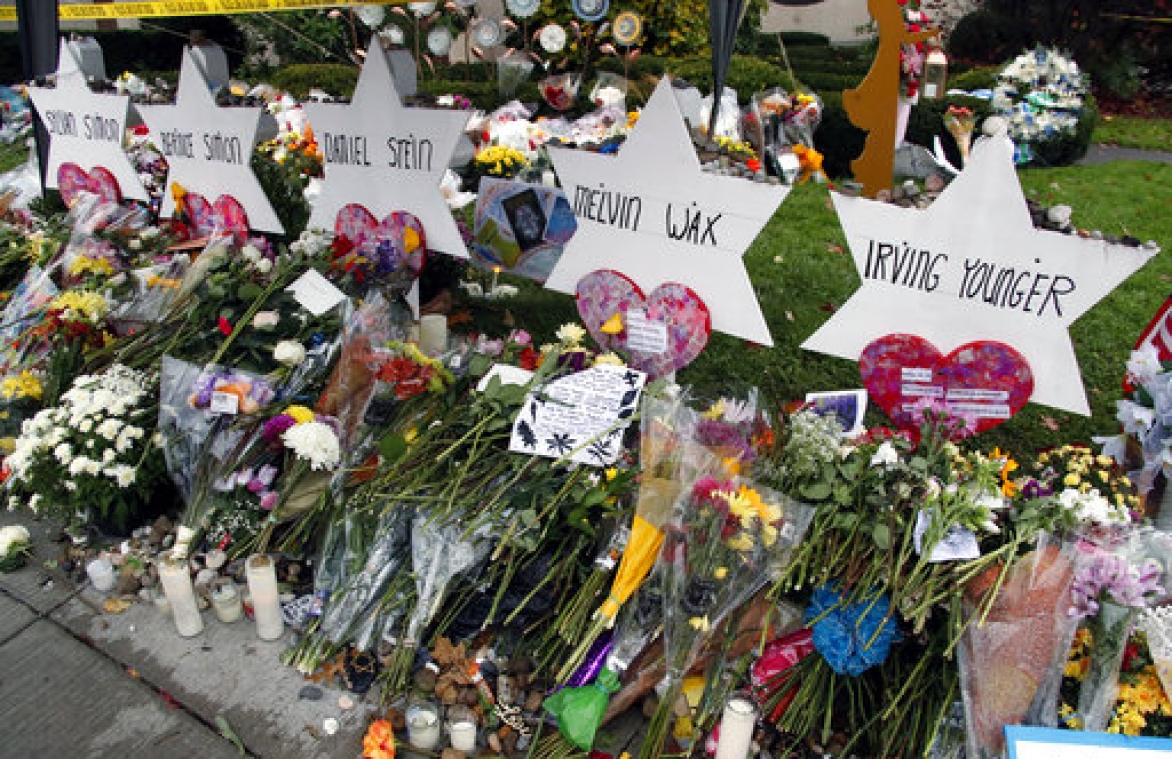Eleven people dead, four wounded during Shabbat morning services at Tree of Life synagogue in Pittsburgh. Stunned, saddened, sick at heart, a nation struggles once again to make sense of the senseless.
Now is the time for mourning. Funerals, vigils and interfaith services this week draw together family, friends and Americans of good will across the nation.
Any mass murder is horrific and tragic, but as President Barack Obama said following the 2015 massacre at Mother Emanuel Church, “There is something particularly heartbreaking about the death happening in a place in which we seek solace and we seek peace, in a place of worship.”
Religious hate crimes are becoming commonplace
The unthinkable is now commonplace in the “land of the free.” Just days before the Tree of Life attack, a gunman in Kentucky shot and killed two African Americans at a grocery story after failing to force his way into a nearby black church.
Perpetuators of religious hate crimes in America are ecumenical. Synagogues, mosques, churches, temples — all now targets of vandalism, assaults and violence. From the massacre of six Sikhs in a Wisconsin temple to the bombing of a mosque in Minnesota to the murder of 26 people in a Baptist church in Texas, a wave of violence in recent years has spared no faith or creed.
It was not supposed to be this way. The promise of religious freedom in America is the promise — first and foremost — of safety. Millions have fled religious wars, persecution and repression seeking a safe haven, a place where they could freely and openly practice their faith without fear.
Letters from the George Washington on religious freedom recalled
Our first president understood the power of this promise. That is why soon after his election George Washington reached out to people of faith, especially those in the minority. In a series of letters written in 1790, he reassured Quakers, Catholics, Baptists and Jews — all victims of prejudice in the New World — that they would be safe under a government committed to religious freedom.
Best known of these letters is Washington’s address to the Hebrew Congregation in Newport, R.I., cited more than once this week. This government, the president declared, “gives to bigotry no sanction, to persecution no assistance.”
Breaking from the precedents of history, the United States has no established religion and guarantees every citizen full free exercise of religion. “All possess alike liberty of conscience and immunities of citizenship,” Washington wrote. “It is now no more that toleration is spoken of, as if it was by the indulgence of one class of people, that another enjoyed the exercise of their inherent natural rights.”
Does this promise of freedom now ring hollow? True, hate crimes against religious communities in this country are not new. Outbreaks of anti-Semitism, nativism and Islamophobia are an ugly part of the American story.
Is religious hate and fear moving into the mainstream?
But are we, as a nation, turning a dark and dangerous corner? Has the language of hate and fear — rhetoric that helps incubate a culture of violence — moved into the mainstream of political discourse?
Thinly veiled anti-Semitic messages and conspiracy theories, propaganda demonizing Islam and Muslims, white nationalists running for office and politicians ginning up fear of refugees and immigrants to win votes — all of this is no longer on the fringe; it is becoming the norm.
Does our government still give “bigotry no sanction, persecution no assistance”? Or do politicians at the highest level — greedy for power — now betray the promise of religious freedom, the promise of a safe haven for all people?
President Washington no doubt knew that our experiment in religious freedom was fragile. Constitutional guarantees of liberty are essential, but not sufficient. Religious freedom as a legal right means little unless people of all religions are safe to practice their faith, wear their religious garb, speak their truth and in other ways follow their conscience without fear of discrimination, persecution or violence.
That is why, perhaps, Washington closed his letter to the Hebrew Congregation with a prayer of hope and a vision of safety drawn from the Book of Micah:
“May the Children of the Stock of Abraham, who dwell in this land, continue to merit and enjoy the good will of the other Inhabitants; while every one shall sit in safety under his own vine and fig tree, and there shall be none to make him afraid. May the father of all mercies scatter light and not darkness in our paths, and make us all in our several vocations useful here, and in his own due time and way everlastingly happy.”
And let the people say, Amen.

